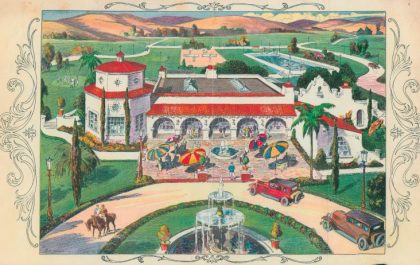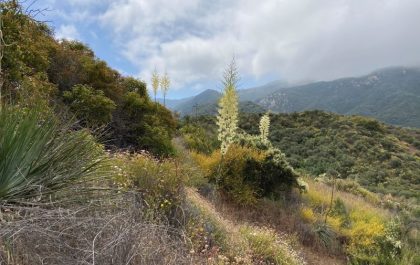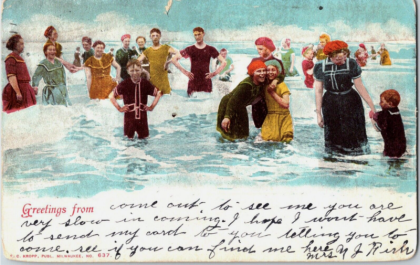
Over the past two decades, narrative historian Candice Millard has become one of America’s preeminent storytellers. While fully committed to the grinding work of comprehensive archival research befitting the hard-driven historians of days-gone-by, Millard’s fluid prose and sprightly sense of humor have resulted in four magnificently crafted and fully accessible gems.
The River of Doubt: Theodore Roosevelt’s Darkest Journey (2005)
Destiny of the Republic: A Tale of Madness, Medicine and the Murder of a President (2011)
Hero of the Empire: The Boer War, a Daring Escape, and the Making of Winston Churchill (2016)
River of the Gods: Genius, Courage, and Betrayal in the Search for the Source of the Nile (2022)
I am reminded of my fondness for the narrative histories of Stephen Ambrose and David McCullough who, like Millard, came to history writing out of personal passion rather than academic acclaim and notoriety. Her titles reveal familiar subjects while her stories offer refreshing new insight illuminating how those we come to admire for grand deeds are often built of different stuff.
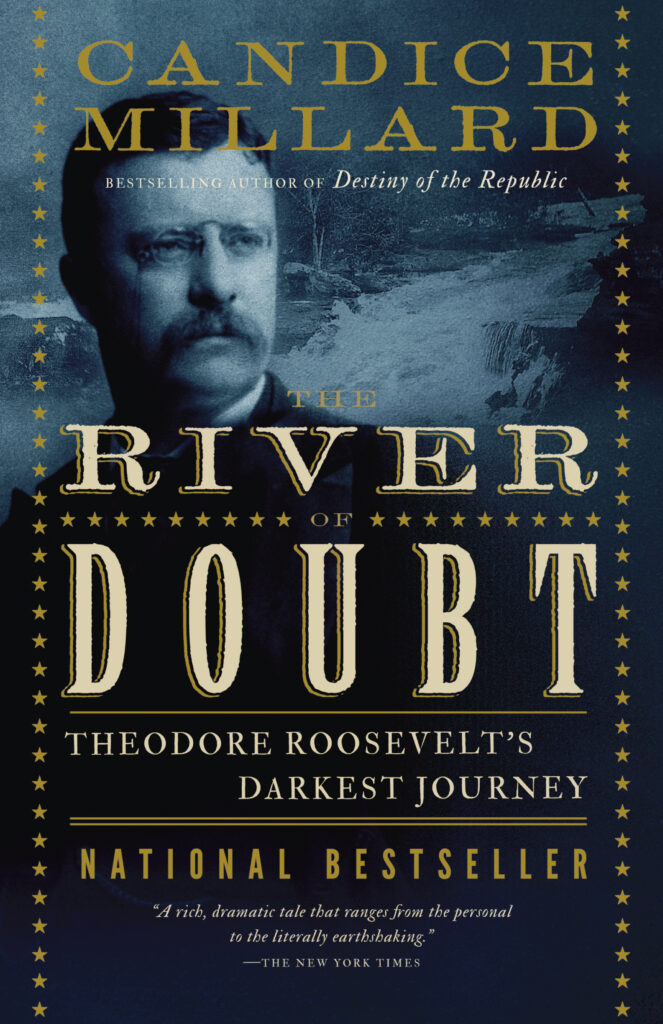
Much has been written about Theodore Roosevelt, one of the most popular and charismatic presidents in United States history. This makes it all the more remarkable that Millard’s The River of Doubt reveals so much. Fresh off of his humiliating defeat to reclaim the presidency in 1912, TR turns his energy toward less-public matters: in this case, filling in some of the blank spaces on the map of the world.
Along with his son Kermit and a host of lesser-known but equally enigmatic personalities—a mainstay of Millard history—Roosevelt floats and paddles down an uncharted tributary of the Amazon River through dense jungle proliferating with all sorts of flora and fauna that pose daily mortal threats.
The telling of this particular adventure doesn’t paint TR in a different light so much as it affirms that his determination, perseverance, and spirit were qualities that carried him throughout his entire life. This one reads like that history teacher you never had.

Her second volume, Destiny of the Republic, explores the assassination of President James A. Garfield whose most notable achievement at once appeared to be getting shot in the back. In Millard’s hands, however, we learn that Garfield was perhaps the last of a breed; someone who became president without actively seeking the office but rather as a result of the deep regard and respect with which he was held.
While Garfield’s circumstances are the backdrop for this story, the central subject is the state of modern medicine in the 1880s. Indeed, Millard does not hold Charles J. Guiteau responsible for Garfield’s death – even though this embittered office-seeker put the bullet in his back—so much as she does the doctor who overtook the president’s care. Rejecting the very new notion that germs and bacteria play a prominent role in wound care, Doctor Doctor Willard Bliss – no typo, his parents named him Doctor – refused to do what we teach our children to do; wash their hands. Indeed, Millard tells of surgeons whose testament to hard work was an apron coated with the blood and pus of many patients.
Incredibly, five years after inventing the telephone, Alexander Graham Bell is called in to help find the bullet lodged in Garfield’s back. As it turns out, his “metal detector” would have succeeded if only the ego of Doctor Doctor hadn’t gotten in the way. This is a grand story and Millard’s Garfield emerges as an honorable, thoughtful, and dedicated figure who was the first president since the Civil War to be admired by the entire country; in other words, the sort of leader who might be useful during today’s political mess. It is observations such as these that make Millard’s history so valuable; history that informs and offers hope to the world in which we now live.
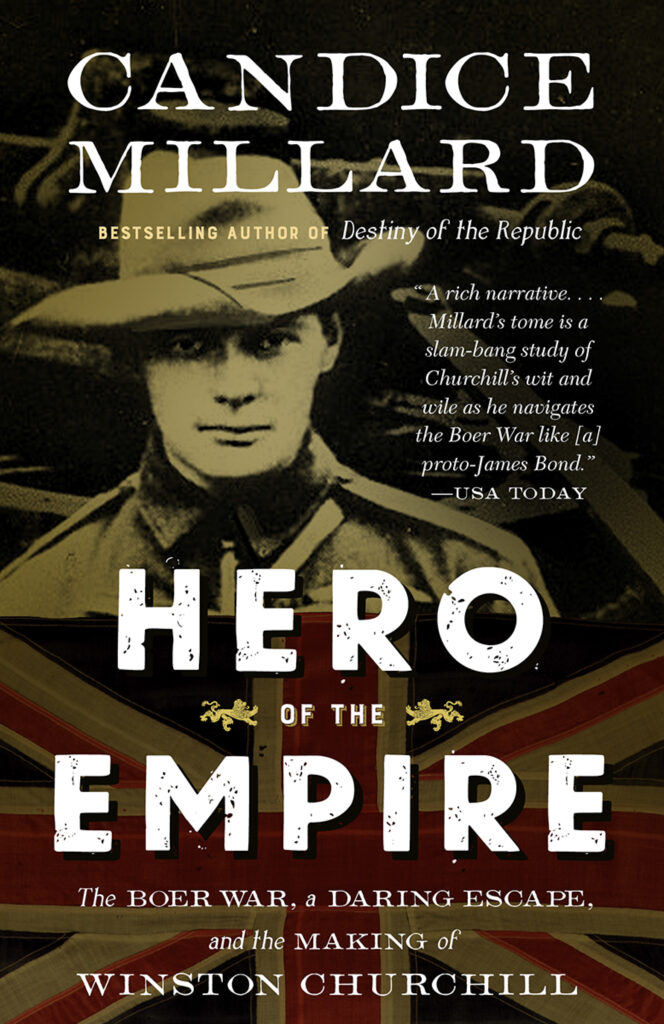
Hero of the Empire focuses on one of the most significant figures in the twentieth century, Winston Churchill. When I write that, I am almost certain that you imagine a rotund and balding Brit, chomping on a cigar, maybe even throwing up a double-finger salute he mistakenly took for the victory sign; all while he goes about saving the world from fascism.** Now, picture that Churchill forty years earlier, twenty-something and yes, chomping away, but this time, at the bit, looking for an opportunity to prove himself. This is Millard’s Churchill, cocky and driven to a fault. Eventually revealed however, is that arrogance can sometimes save the day.
The setting for much of Hero of the Empire is the Boer War at the turn of the twentieth century. And, while we get a full helping of Winston Churchill adventure – a daring escape from a POW camp – we also get a fascinating lesson on the European conquest of Africa including an early history of the origins of the modern nation of South Africa.
Quoting a life-long friend of Churchill, Millard captures so much with so little. “The first time you meet Winston you see all his faults,” recalls Pamela Plowden, Churchill’s first and unrequited love, “and the rest of your life you spend in discovering his virtues.” (Thoughts such as these have me wondering how many virtuous people I have dismissed on account of a bad first impression.)
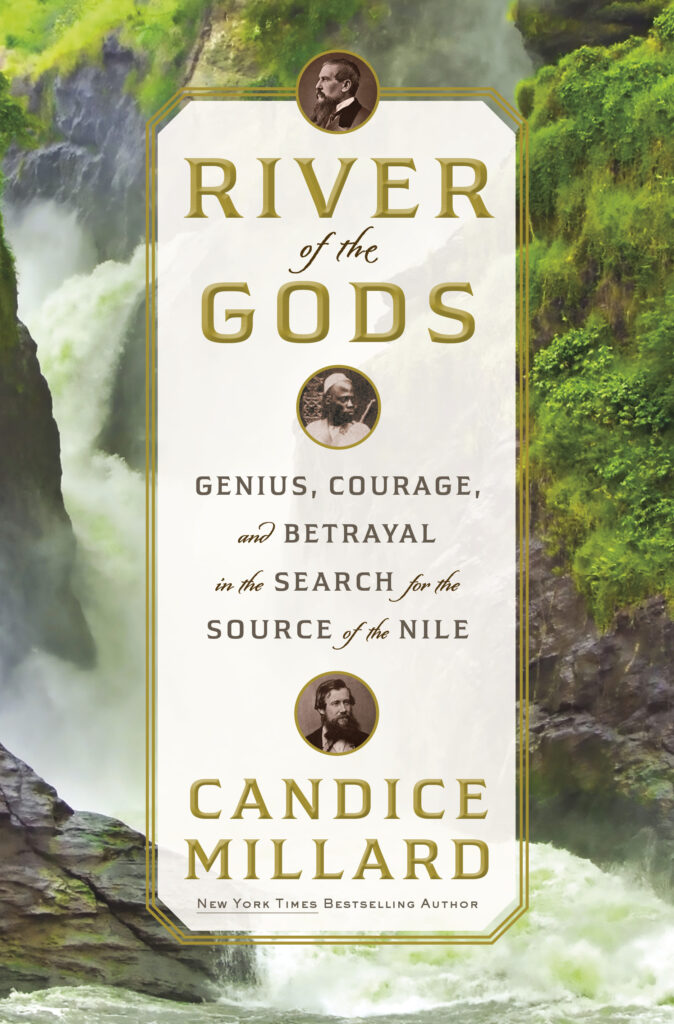
Millard’s most recent volume is 2022’s River of the Gods, focused on the near-eternal search for the source of the Nile River; the world’s longest.
Featured in this one are English explorers Richard Burton and John Hanning Speke, familiar to many; but only because it is the white guys who have written so much of the record. Candice Millard, sensitive to but not overwhelmed by the historical dearth of diverse voices in the history books—as participants and writers—elevates Burton and Speke’s sidekick Sidi Mubarak Bombay; perhaps to his rightful position as the most accomplished of the three intrepid adventurers.
The African geography lesson continues in River of the Gods as the expeditions documented here begin on Africa’s eastern coast on the Indian Ocean. Millard does an extraordinary job of sorting out the complicated relationships between different African ethnic groups and the variety of European colonizers they encounter. This is especially enlightening as we learn of human enslavement separate from the Atlantic slave trade of which the United States participated.
As in all of her work, Millard never misses an opportunity to paint the broad canvas upon which her featured story is painted. Each of these books tells a specific tale while engaging in the broader history of its setting; ensuring for the historian and novice reader alike, a bountiful and pleasurable experience.
*Some of these same historians refer to the “short twentieth century” – 1914 to the collapse of the Soviet Union in 1991 although more recent events suggest that the demise of the Soviet Union may not be the marker of history we originally imagined it to be.
** Churchill didn’t know that this gesture meant “up your bum” and this episode is rendered brilliantly in the 2016 film The Finest Hours.
More ways to learn about Candice Millard. Watch this PBS interview or, visit her website.
